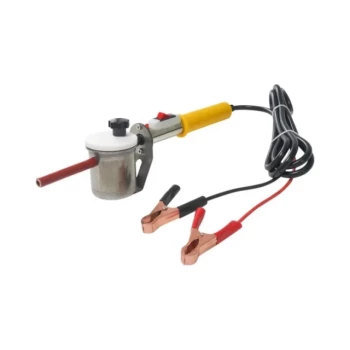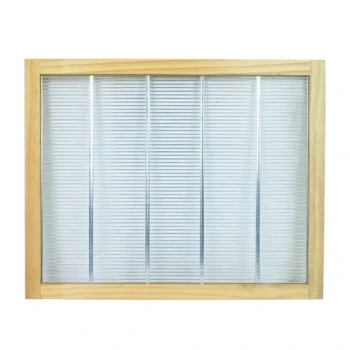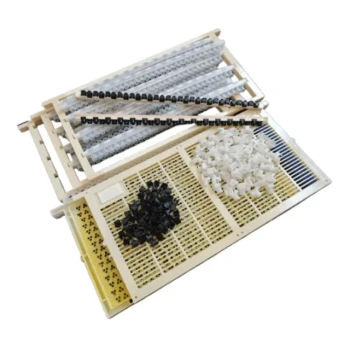When you notice a declining bee colony, you must immediately investigate three primary culprits: a failing queen, a high Varroa mite infestation, or the presence of disease. Promptly identifying the specific cause is the most critical step, as the correct response for one issue will not solve another and can waste precious time.
A shrinking colony is not a single problem but a symptom of an underlying issue. Your role is to shift from reactive worry to a systematic diagnosis, because applying the right solution to the right problem is the only effective way to save the hive.
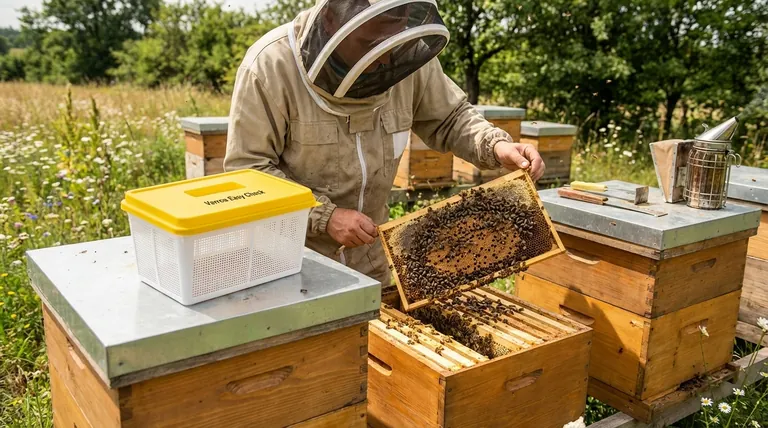
A Systematic Approach to Colony Diagnosis
Observing a dwindling population can be alarming, but a calm, methodical inspection will reveal the root cause. Treat your inspection like a detective's investigation, gathering clues from the brood nest to form a conclusion.
Step 1: Evaluate the Queen
A healthy, productive queen is the engine of the colony. A failing queen is one of the most common reasons for a population to decline.
Your primary goal is to assess her laying pattern. A strong queen will lay eggs in a tight, consolidated pattern, creating a solid wall of capped brood.
Look for a spotty or "shotgun" brood pattern, where cells are randomly filled or empty. This is a classic sign of a failing or poorly-mated queen. Also, check for the presence of fresh eggs—tiny white specks, one per cell, at the very bottom. Their presence proves the queen was active within the last three days.
Step 2: Conduct a Varroa Mite Check
Varroa destructor mites are the single greatest threat to honey bee health worldwide. They weaken bees by feeding on their fat bodies and act as vectors for a host of debilitating viruses.
A visual inspection is not enough; you must test for mites to know your infestation level. The most common methods are a sugar roll or an alcohol wash, which dislodge mites from a sample of nurse bees.
Your mite count should be below the treatment threshold, which is typically 2-3 mites per 100 bees. If your count is higher, the mite load is actively harming your colony's health and requires immediate intervention.
Step 3: Inspect for Common Diseases
While a queen or mite issue is more probable, you must rule out brood diseases that can decimate a colony.
Look for visual signs of unhealthy larvae. Healthy larvae are plump and pearly white. Be concerned if you see larvae that are yellowed, brown, or have melted into a gooey substance.
Pay close attention to the brood cappings. Sunken, perforated, or darkened cappings can indicate diseases like American Foulbrood (AFB) or European Foulbrood (EFB). Unpleasant odors, often described as sour or fishy, are another major red flag.
Understanding the Pitfalls and External Factors
Simply identifying a symptom is not enough. A successful beekeeper understands the context and avoids common mistakes in diagnosis.
The Danger of Misdiagnosis
Applying the wrong treatment is a critical error. Requeening a hive that is collapsing from a high mite load will not solve the problem. Likewise, treating for mites will do nothing if the queen has already failed. Each day spent on the wrong solution allows the true problem to worsen.
Forgetting Environmental Pressures
Not all problems are internal to the hive. Consider factors outside your control. Is there a nectar dearth in your area, leading to poor nutrition? Has there been nearby pesticide application? Extreme weather, such as prolonged drought or cold, can also put immense stress on a colony and halt its growth.
Acting Too Late
A weak colony is a target. It cannot defend itself against robbing bees from stronger nearby hives, which will steal its remaining honey stores. Once robbing begins, the colony's collapse is almost always irreversible. Speed is essential.
How to Apply Your Diagnosis
Once you have identified the most likely cause, you can take clear, targeted action.
- If your primary issue is a failing queen: The definitive solution is to requeen the colony with a new, healthy, and well-mated queen.
- If your primary issue is a high Varroa mite count: You must apply an appropriate miticide treatment immediately, choosing a product that is safe for the current season and temperature.
- If your primary issue is a suspected brood disease (like AFB): Do not attempt to treat it yourself. Contact your regional apiary inspector or beekeeping association for a formal diagnosis and guidance, as some diseases require destroying the hive to prevent spread.
Proactive and regular hive inspections are the foundation of successful beekeeping, allowing you to catch these signs early and act before the decline becomes irreversible.
Summary Table:
| Diagnosis Step | What to Look For | Critical Action |
|---|---|---|
| 1. Evaluate the Queen | Spotty brood pattern, lack of fresh eggs | Requeen the colony |
| 2. Check for Varroa Mites | Mite count > 2-3 per 100 bees | Apply appropriate miticide treatment |
| 3. Inspect for Disease | Discolored larvae, sunken cappings, foul odor | Contact an apiary inspector |
Don't let a declining colony threaten your operation. Proper diagnosis requires reliable, high-quality equipment for accurate inspections and effective treatments. HONESTBEE supplies commercial apiaries and beekeeping equipment distributors with the durable, wholesale-focused supplies needed to maintain healthy, productive hives. From mite testing kits to essential hive tools, we equip you for success. Contact our experts today to discuss your wholesale needs and protect your investment.
Visual Guide
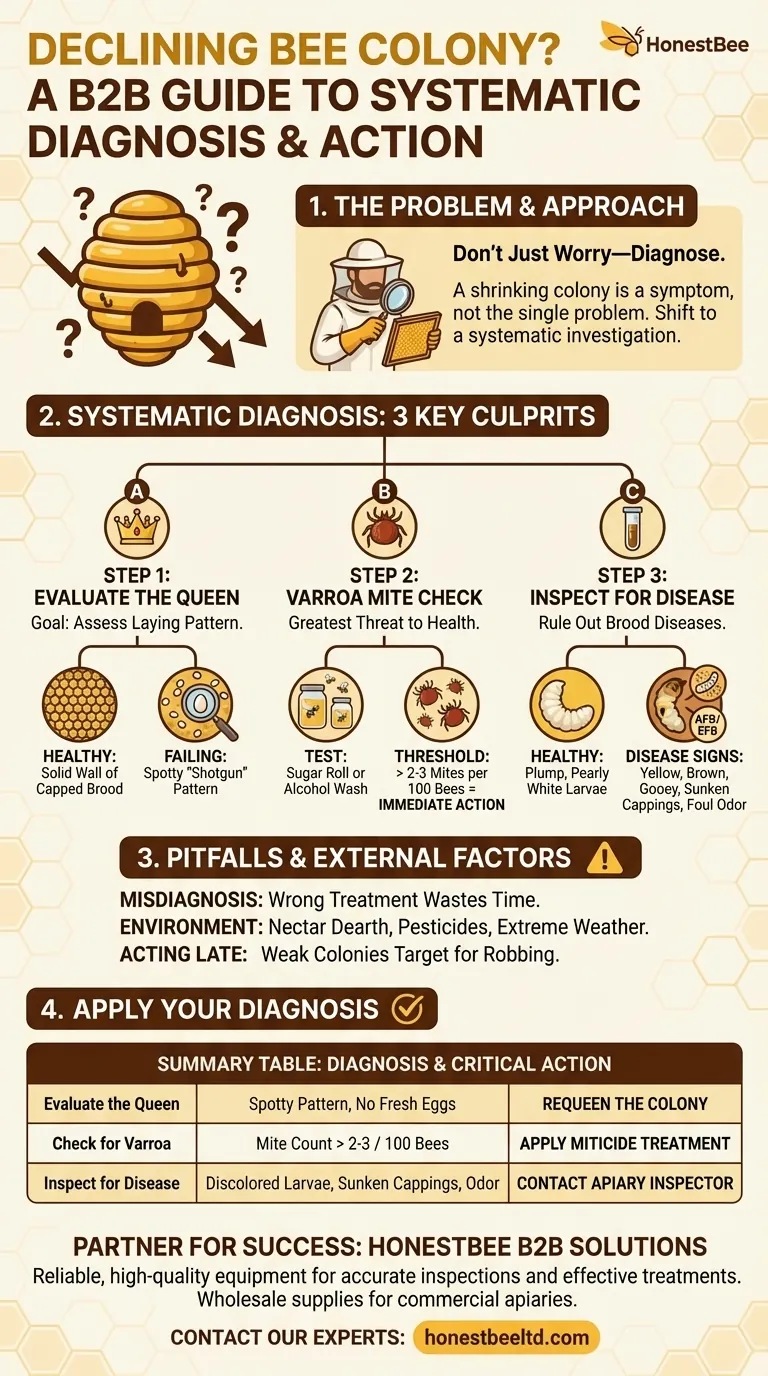
Related Products
- Varroa Easy Check Mite Tester Kit Counter Alcohol Wash Jar
- Durable 12V Oxalic Acid Vaporizer for Varroa Mite Treatment Beehive Beekeeping Tool
- 12V Bee Mite Removal Evaporator Oxalic Acid Vaporizer for Bee Fumigation Treatment 180W Atomization
- Oxalic Acid Vaporizer 12V for Bee Varroa Mite Treatment
- Heavy Duty 12V Oxalic Acid Evaporator Vaporizer for Bee Varroa Mite Treatment Beekeeping Fumigator Atomizer
People Also Ask
- How is the powdered sugar shake method performed to detect Varroa mite levels? Protect Your Bees with This Guide
- How does a Varroa mite testing kit using the alcohol wash method contribute to honeybee colony management? Key Benefits
- How does a shake jar containing 70% alcohol facilitate assessment of Varroa mite infestation rates? Industry Insights
- How do specialized Varroa mite detection equipment and alcohol function in the alcohol wash method? Master Mite Control
- What are the components of the three-part monitoring tool designed for Varroa alcohol washes? Optimize Bee Health


